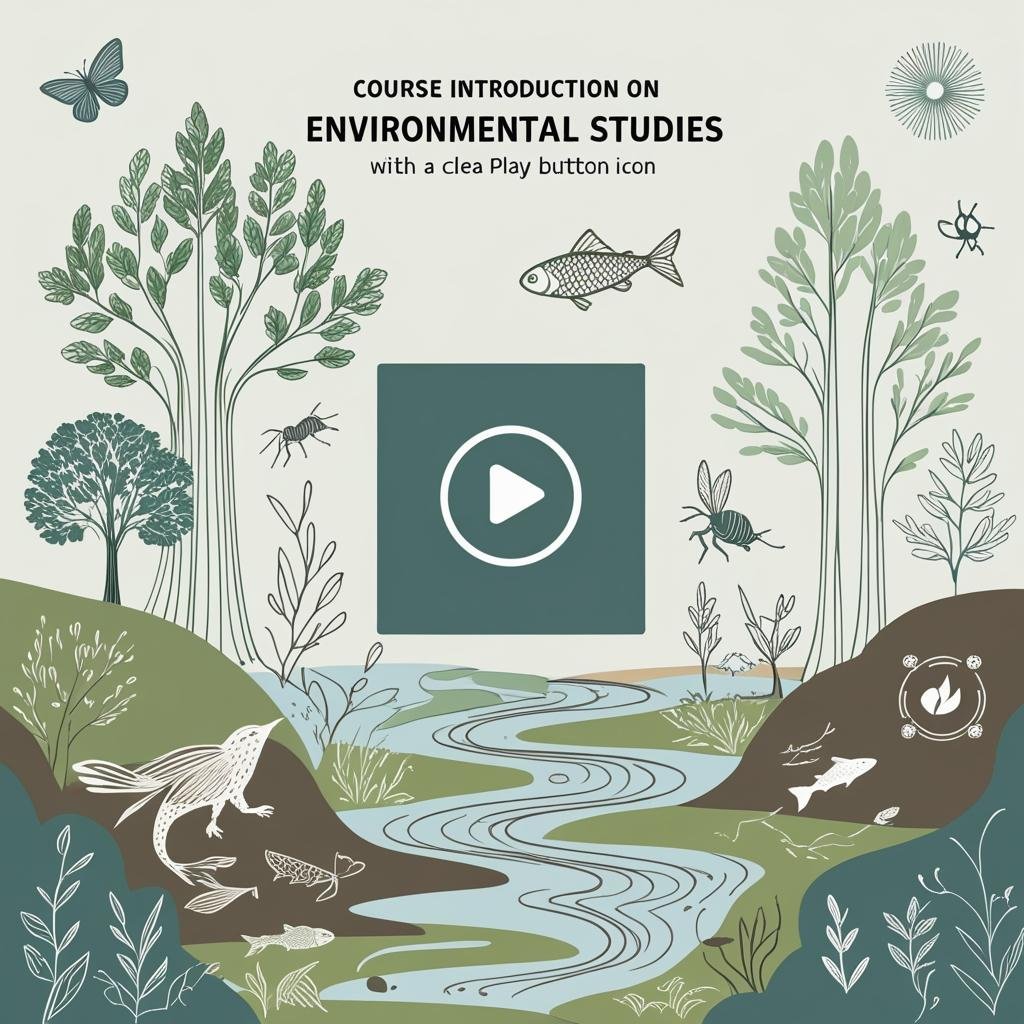
https://www.canva.com/design/DAGws6j7Kmo/rDTaAVlTLI68oIC8zGgE5Q/view
| Course Status : | Ongoing |
| Course Type : | Core |
| Language for course content : | English |
| Duration : | 12 weeks |
| Category : |
|
| Credit Points : | 3 |
| Level : | Undergraduate |
| Start Date : | 21 Aug 2025 |
| End Date : | 24 Oct 2025 |
| Enrollment Ends : | 04 Aug 2025 |
| Exam Registration Ends : | 22 Aug 2025 |
| Exam Date : | 24 Oct 2025 IST |
| NCrF Level : | 3.0 |
About the Course
This course focuses on the basic concepts of ecology, ecosystem types and services, concepts of biodiversity, its loss and conservation. This course provides thorough understanding of global environmental problems due to the growing perceptions of threats posed by pollution to human health, ecology, and planetary functioning. This course also provides a comprehensive overview of the main concepts, principles, strategies, and technologies involved in managing environmental pollution. Through a multidisciplinary approach, students will study the causes and consequences of pollution, as well as explore the tools and techniques available for its prevention, control, and abatement. The concept of land, soil and water as a natural resource and their conservation measures has also been included. The course also covers the importance of natural resources, energy resources, and mineral resources for the human kind, besides exploring the sustainable issues related to energy and mineral resource management.
Course Layout
Week 1: Environment and its multidimensional Nature: Definition Scope and importance
Lecture 0 : Structure of Environmental studies course
Lecture 1 : Environment and its multi-dimensional nature. Definition, scopes and importance
Lecture 2 : Renewable and non-renewable resources: Food and food resources
Week 2: Renewable and non-renewable natural resources (Energy, Forest, Land, Mineral, and water resources)
Lecture 3 : Renewable and non-Renewable Energy resources
Lecture 4 : Forest Resources
Lecture 5 : Land resources
Lecture 6 : Mineral Resources
Lecture 7 : Water Resource
Week 3: Biogeochemical cycles (Carbon, Oxygen, Sulphur, Phosphorus and Nitrogen cycle)
Lecture 8 : Biogeochemical cycle: Carbon Cycle
Lecture 9 : Biogeochemical cycle: Oxygen cycle
Lecture 10 : Biogeochemical cycle: Sulphur Cycle
Lecture 11 : Biogeochemical cycle: Phosphorus cycle
Lecture 12 : Biogeochemical cycle: Nitrogen cycle
Week 4: Ecosystem structure and Types of Ecosystem (forest, grassland, aquatic, desert etc)
Lecture 13 : Concept of Ecosystem and its Characteristics
Lecture 14 : Components of ecosystem- Abiotic
Lecture 15 : Components of ecosystem- Biotic
Lecture 16 : Food Chain, Food Web, and Ecological Pyramids;
Lecture 17 : Types of Ecosystem (Aquatic and Terrestrial Ecosystems)
Week 5: Concepts of Biodiversity, Biodiversity hotspots, Biodiversity conservation (in-situ and ex-situ conservation)
Lecture 18 : Concept of Biodiversity, Levels of Biodiversity
Lecture 19 : Threats to Biodiversity
Lecture 20 : Biodiversity Hotspots
Lecture 21 : Protected Areas and their network in India (In situ conservation)
Lecture 22 : Ex-situ conservation: strategies, success: An integrated approach to biodiversity conservation.
Week 6: Environmental pollution; water, air and land pollution
Lecture 23 : Environmental pollution and air pollution
Lecture 24 : Air pollution
Lecture 25 : Water pollution
Lecture 26 : Soil pollution
Week 7: Climate change and global warming, Environmental laws
Lecture 27 : Climate change and global warming, Causes and Consequences
Lecture 28 : Environment Conservation Laws in India-Environment (Protection) Act
Lecture 29 : Biological Diversity Act 2002
Lecture 30 : Wildlife (Protection) Act, 1972 part 1
Lecture 31 : Forest (Conservation) Act and Water (Prevention and Control of Pollution) Act
Lecture 32 : Air (Prevention and Control of Pollution) Act and National Environmental Tribunal Act
Week 8: Social issues and the environment; sustainable development
Lecture 33 : Role of NGOs in Environment conservation
Lecture 34 : Social issues and the environment: Sustainable development
Lecture 35 : Sustainable development benefits and UN Sustainable Development Goals
Lecture 36 : Conclusion of Environmental studies course
Pre-requisite: As this course is designed for Undergraduate students, hence 12th is compulsory to pass/clear
Assignments : 15% Assisnment, 15% MCQs,
- Teacher: Admin User